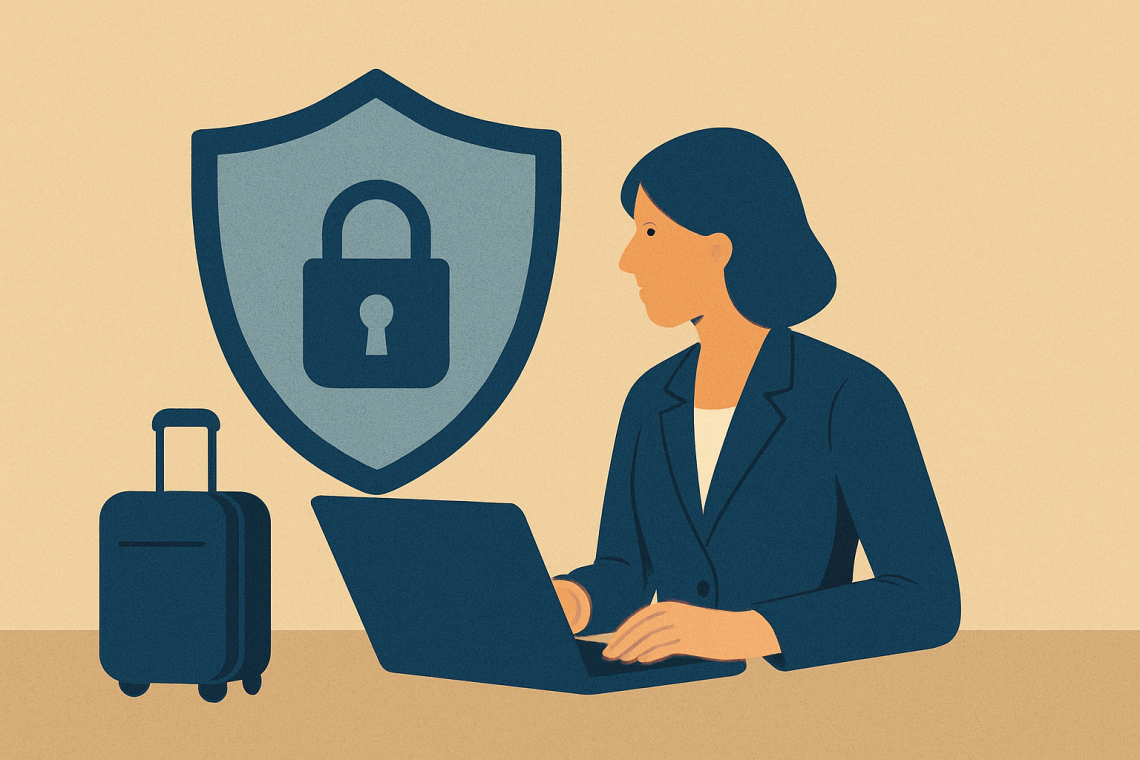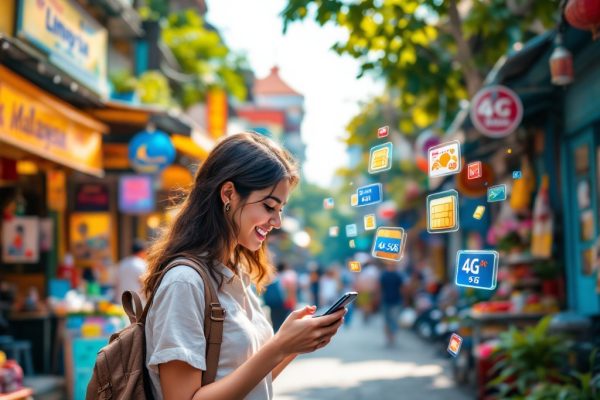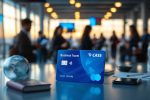Cybersecurity for Business Travelers: Protecting Your Data on the Go
Traveling for business? Don’t let cyber threats derail your trip. From public Wi-Fi risks and phishing scams to device theft and data breaches, this guide reveals the cybersecurity dangers lurking around every corner. Discover how to protect yourself and your company with practical tips, including using VPNs, securing devices, and recognizing phishing attacks. Learn how to create strong passwords, enable two-factor authentication, and implement essential cybersecurity hygiene. Start safeguarding your digital life today – read on to travel smart and stay secure.
Important information
- Use strong, unique passwords and two-factor authentication (2FA) to protect your accounts.
- On public Wi-Fi, always use a VPN to encrypt your connection and protect your data.
- Avoid public USB charging stations and use your own charger to prevent “juice jacking.”
- Secure your devices with strong passwords, encryption, and remote wiping capabilities.
- Be aware of phishing attacks and suspicious links. Never click on links from unknown senders and report suspicious emails to IT.
Understanding Cybersecurity Threats for Business Travelers
Use a VPN on Public Wi-Fi
Public Wi-Fi hotspots are convenient, but they expose your sensitive data to hackers. Using a VPN creates a secure connection, protecting your information while you travel.
Beware of Phishing Attacks
Phishing emails are deceptive messages designed to trick you into revealing your login credentials. Exercise caution with suspicious emails and never click on unknown links.
Secure Your Devices
Device theft can compromise company data. Protect your devices with strong passwords and encryption, and consider enabling remote wiping capabilities.
Avoid Public Charging Stations
Even seemingly harmless charging stations can be tampered with to install malware on your devices. Using your own charger is a simple yet effective way to prevent this.
Cybersecurity Risks for Business Travelers
- data breaches,
- financial losses,
- reputational damage.
Stay Vigilant and Take Precautions
By taking these precautions, you can protect yourself and your company while traveling.
Identifying Cyber Risks During Travel
Traveling exposes your data and devices to cyber risks. Public Wi-Fi, particularly in cafes and airports, often lacks security, making it easy for hackers to access your information. Similarly, public USB charging stations can infect your devices with malware. Never leave your devices unattended to prevent theft and unauthorized access. Disable Bluetooth and NFC when not in use to avoid connecting with unknown devices. Be wary of phishing emails and suspicious links, as they can compromise your data. Data privacy laws vary by country, so stay informed and travel safely.
Beware of public Wi-Fi. Public Wi-Fi hotspots, especially in cafes and airports, are often unsecured. This makes them easy targets for hackers looking to intercept your data.
Avoid public USB charging stations. These stations can be infected with malware that can compromise your devices. It’s safer to use your own charger and a power outlet.
Never leave your devices unattended. This simple precaution can prevent theft and unauthorized access to your personal information.
Disable Bluetooth and NFC. When not in use, disabling these features prevents your devices from automatically connecting to unknown and potentially malicious devices.
Be cautious of phishing emails and suspicious links. Avoid clicking on links or opening attachments from unknown senders, as these can lead to phishing attacks and malware infections.
Be aware of data privacy laws. Data privacy regulations vary significantly between countries. Research the laws of the countries you’re visiting to understand how your data will be handled.
Common Cyber Attacks on Business Travelers
Phishing attacks are a common online threat that uses deceptive emails and messages to steal your personal data. Be wary of suspicious communications. Device theft also presents a serious risk. Losing a laptop or smartphone can expose sensitive information, so protecting your devices is crucial. Public Wi-Fi networks pose another threat, allowing hackers to potentially access your data. Travelers should be particularly vigilant. Using a VPN can enhance security by encrypting internet traffic and shielding data from prying eyes. Weak passwords create vulnerabilities. Strong, unique passwords are essential for online safety.
Phishing Attacks
Be wary of suspicious emails and messages that may try to steal your personal data. Always verify the sender and avoid clicking on suspicious links.
Device Theft
Losing a device can expose sensitive information. Protect your devices with strong passwords, encryption, and tracking software.
Public Wi-Fi Risks
Hackers can potentially access your data on public Wi-Fi. Use a VPN to encrypt your internet traffic and protect your information.
Weak Passwords
Weak passwords make you vulnerable to attacks. Create strong, unique passwords for each of your online accounts.
The Dangers of Public Wi-Fi and Free Networks
Public Wi-Fi hotspots offer convenience but often compromise security, making them vulnerable to cyberattacks. Therefore, refrain from conducting sensitive activities like online banking or accessing work files on these networks. Cybercriminals exploit unsecured networks to intercept data. If you must use public Wi-Fi, a VPN is crucial. A VPN establishes a secure connection by encrypting your internet traffic, shielding your data from prying eyes, and adding an extra layer of protection.
Pre-Travel Precautions for Business Security
Before traveling, update your software, including operating systems and security applications, to their latest versions. These updates frequently patch security vulnerabilities, minimizing your cyberattack risk. For added security, consider a travel-only laptop with minimal sensitive data. This limits the damage if the device is lost or stolen. Protect your credit cards and passport with RFID-blocking wallets and sleeves, preventing unauthorized scanning. A privacy screen protector also safeguards your screen from prying eyes in public places.


















